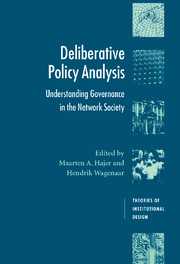Book contents
- Frontmatter
- Contents
- List of contributors
- List of figures
- List of tables
- Preface
- Introduction
- Part I Policy conflict and deliberation in the network society
- Part II Rethinking policy discourse
- Part III Foundations of deliberative policy analysis
- 7 Beyond empiricism: policy analysis as deliberative practice
- 8 Accessing local knowledge
- 9 Theoretical strategies of poststructuralist policy analysis: towards an analytics of government
- References
- Subject index
- Author index
9 - Theoretical strategies of poststructuralist policy analysis: towards an analytics of government
Published online by Cambridge University Press: 22 September 2009
- Frontmatter
- Contents
- List of contributors
- List of figures
- List of tables
- Preface
- Introduction
- Part I Policy conflict and deliberation in the network society
- Part II Rethinking policy discourse
- Part III Foundations of deliberative policy analysis
- 7 Beyond empiricism: policy analysis as deliberative practice
- 8 Accessing local knowledge
- 9 Theoretical strategies of poststructuralist policy analysis: towards an analytics of government
- References
- Subject index
- Author index
Summary
When authors in the field of policy studies describe their approach as ‘discourse analysis’, many different things can be meant by this label, ranging from a Habermasian to a deconstructivist style of analysis. In this chapter I will draw some insights from poststructuralist theory for a discourse-analytical reading of the policy process. I will address a number of central, analytical questions that are raised by a poststructuralist perspective of the process of policymaking.The approach I present is eclectic and draws on different theory traditions. I will show that poststructuralism offers a number of well-defined epistemological points of departure to develop a distinct set of conceptual tools which lead to a new understanding of the policy process. Furthermore, I will show how Foucault's analytics of government can inform policy analysis and sheds new light on the transformation of government practices in the emerging network society. Throughout my discussion I will draw on empirical examples from genetic engineering and medical policymaking to illustrate my argument.
The chapter goes from the general and theoretical to the specific and applied. The first part locates poststructuralist policy analysis within the larger context of current post-positivist social theory and methodology. I will then discuss how a discourse-analytical approach towards policymaking conceptualizes government and leads to a novel understanding of the policy process and the newly emerging topography of politics.
Points of departure I: policy analysis after Saussure
Poststructuralist policy analysis should be perceived as an expression of the larger, post-positivist movement in the social sciences.
- Type
- Chapter
- Information
- Deliberative Policy AnalysisUnderstanding Governance in the Network Society, pp. 247 - 265Publisher: Cambridge University PressPrint publication year: 2003
- 49
- Cited by

